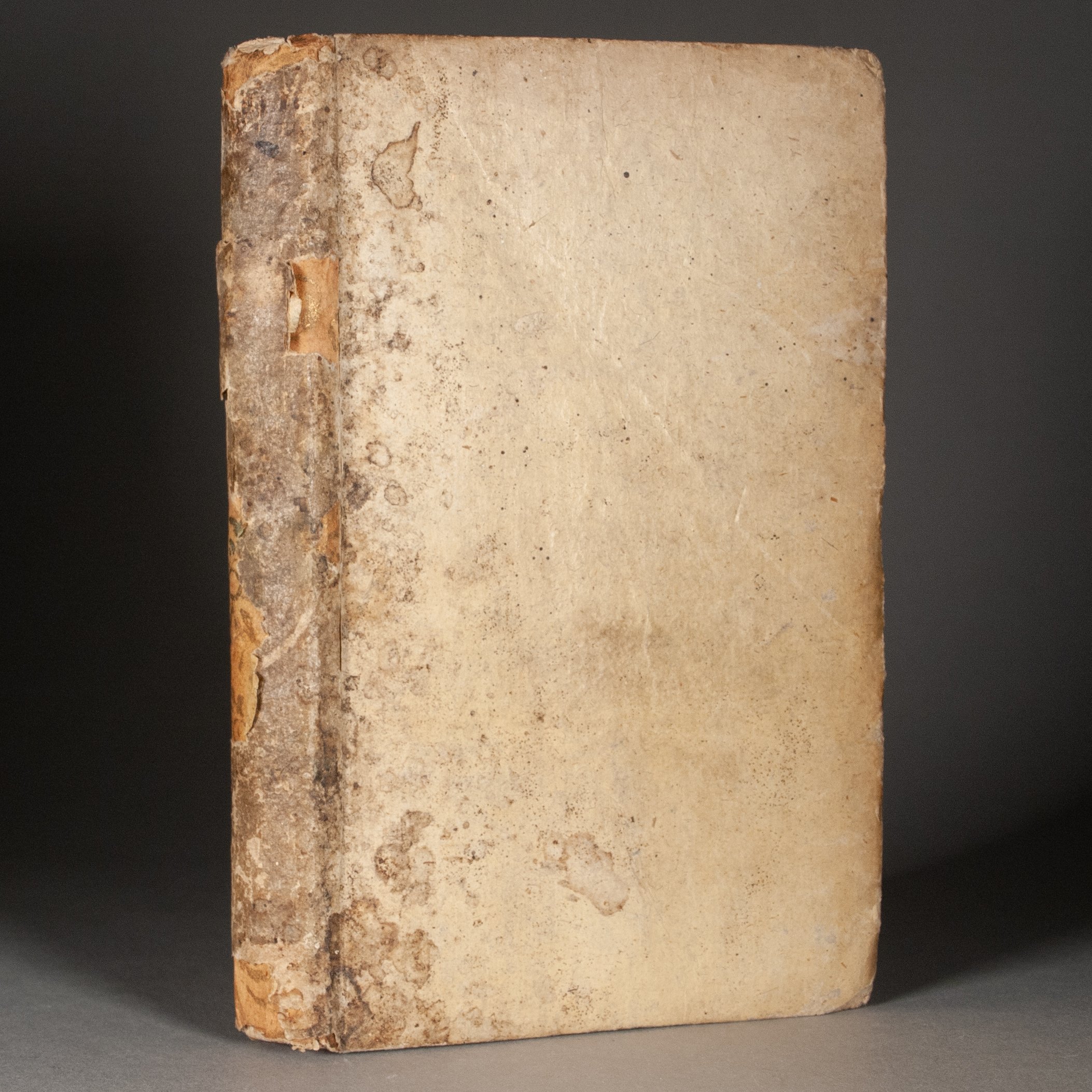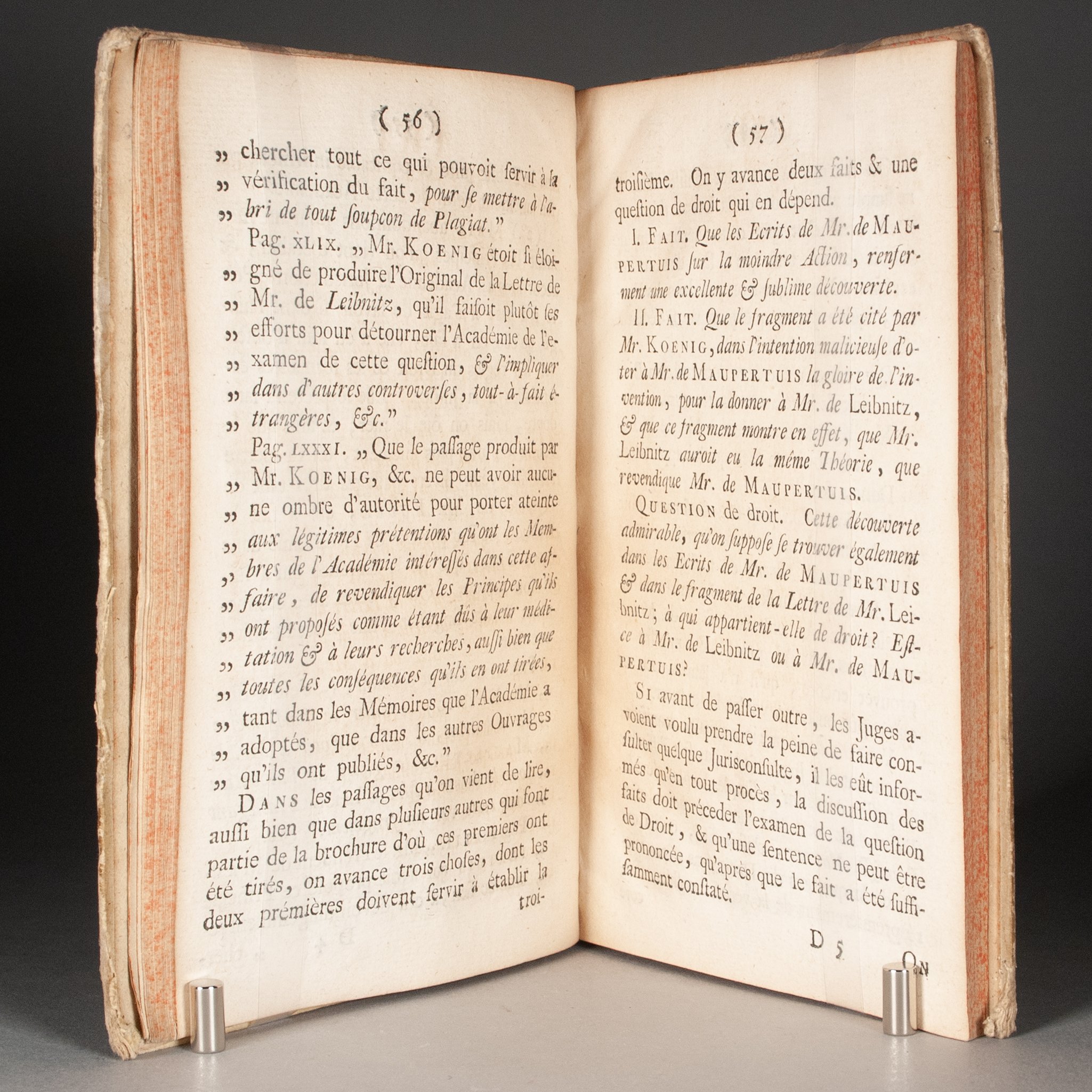Mathematician's desperate defamation of a colleague




Mathematician's desperate defamation of a colleague
Appel au public du jugement de l'Académie royale de Berlin sur un fragment de lettre de Mr. de Leibnitz cité par Mr. Koenig
by Samuel König (Koenig)
Leiden: Elie Luzac, 1752
122, [2]; 68 p. | 8vo | A-G^8 H^6; A-D^8 E^2 | 180 x 110 mm
First edition of König's own defense in what came to be called the König Affair, “the leading scientific controversy of the century” (Calinger, Life) and "one of the most celebrated intellectual incidents in history" (Calinger, Genius). The controversy centered on who deserved credit for developing the principle of least action, or the stationary-action principle, which remains critical to physics and mathematics today. Credit typically goes to Pierre Louis Maupertuis, if sometimes shared with Leonhard Euler. But in 1751, Samuel König produced a copy of a 1707 letter by Gottfried Leibniz as evidence that Maupertuis had plagiarized him. In the end, König was accused of forging the Leibniz letter. Copies of the letter have since come to light, but any original remains lost. ¶ The controversy embroiled the Berlin Academy of Sciences, provoked the satirical pen of Voltaire, and generated enough gravity of its own to rouse numerous hot takes on both sides. Pitting a Frenchman against a German-born scientific system, “it triggered emergent cultural-national sensitivities. The newly established scholarly review journals and the wider press in the German lands took up the topic and made it a matter for independent assessment by the public (Öffentlichkeit). The issue spilled beyond the frame of the Berlin Academy” (Zammito). Certainly Voltaire’s contributions to the debate, which did lasting damage to Maupertuis, fanned the flames. ¶ Though written in the third person, the present contribution is indeed the work of König himself, his appeal to the public once it became clear that he would be unable the change minds at the Berlin Academy. "On 13 September 1752 the third act of the affair commenced when König angrily returned to the Berlin Academy his diploma of foreign membership and issued his 'Appel au Public...,'" namely the present, "holding that the fragment—while not written in Leibniz's hand—contained the content and form with markings indicating the authenticity of the original. He cited in full four letters from Leibniz that he had purchased from Henzi, rejected the related articles of Euler on the principle of least action in general, and denounced the tyranny of the Royal Prussian Academy...Mainly abandoning the Leibniz letter, König repeated that the genesis of the principle of least action stretched from Aristotle to Wolff, and he claimed to have found errors in Euler's determination of equilibrium. In the scientific community, the 'Appel au Public' gained him much sympathy" (Calinger, Genius). Posterity, however, has been less sympathetic. König is best remembered today for this attempt to strip Maupertuis, a fellow student of Bernoulli, of his accomplishment. But credit where credit's due: König did tutor Émilie du Châtelet. ¶ WorldCat reports no copies in North America, and we find just a single copy in auction records (Swann, 1998).
PROVENANCE: From the library of the Berlin Staatsbibliothek, with its earliest recorded ink stamp on the title verso (used 1795-1840), and its withdrawal stamp below it.
CONDITION: Plain paper over boards, with the outer paper actually over some brocade paper, visible beneath some spine tears; edges sprinkled red. Leaf H6 is blank. ¶ Second leaf (Avertissement) soiled and worn, with a few small tears affecting text, including loss in the lower corner (since filled); occasional light foxing. Spine cocked, heavily soiled, and worn, with several tears (revealing brocade paper beneath); recased using brown paper tape at the hinges, and rather surprisingly not as offensive as it sounds.
REFERENCES: Bibliotheca Osleriana (1987), p. 497, #5553 (the 1753 second edition) ¶ Ronald S. Calinger, Leonhard Euler: Mathematical Genius in the Enlightenment (2016), p. 353 (cited above); Ronald S. Calinger, “Leonhard Euler: Life and Thought,” Leonhard Euler: Life, Work and Legacy (Elsevier, 2007), p. 36, 37 (“In 1752 the debate turned from a scientific quarrel into a literary affair when Voltaire, who was in Potsdam visiting Frederick, issued his caustic satire Diatribe du Docteur Akakia”); John H. Zammito, The Gestation of German Biology: Philosophy and Physiology from Stahl to Schelling (Univ of Chicago, 2018), p. 124; J.B. Shank, The Newton Wars and the Beginning of the French Enlightenment (Univ of Chicago, 2008), p. 474 (“Maupertuis saw in this paper both an accusation of plagiarism and a challenge to his honor. He, therefore, deployed his full authority at the Berlin Academy to punish König for this alleged attack. Many saw in Maupertuis’ conduct an egregious and despotic misuse of his authority…In April 1752, the Berlin Academy issued its ruling against König, bringing the full weight of its authority down upon him and his charges…Overall, the trial and condemnation of König triggered an international debate about the conduct and character of the Berlin Academy and its president, and Voltaire played a key role in fueling the dispute.”); Shirley A. Roe, “Voltaire Versus Needham: Atheism, Materialism, and the Generation of Life,” Journal of the History of Ideas 46.1 (Jan-Mar 1985), p. 72 (on Voltaire’s involvement); Bibliotheksstempel: Besitzvermerke von Bibliotheken in der Bundesrepublik Deutschland (1998), p. 21 (for the Berlin library stamp)
Item #653
